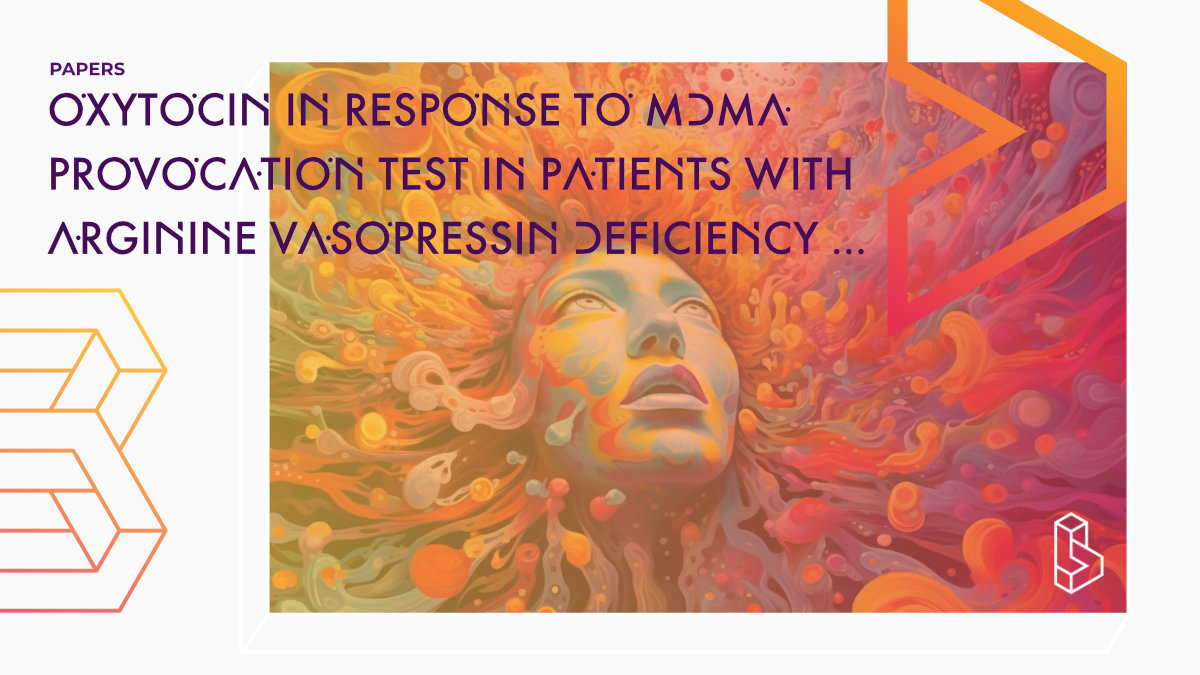This double-blind, placebo-controlled study (n=30) explores oxytocin deficiency in patients with arginine vasopressin deficiency (central diabetes insipidus), using MDMA as a biochemical and psychoactive provocation test. The participants included patients with vasopressin deficiency and healthy controls, who were given either MDMA or placebo in a randomized order over two sessions. The results show that the MDMA-induced increase in plasma oxytocin concentrations was significantly lower in patients than in healthy controls, suggesting the presence of a clinically meaningful oxytocin deficiency in the patient group. These findings could pave the way for identifying a new hypothalamic-pituitary disease entity.
Abstract of Oxytocin in response to MDMA provocation test in patients with arginine vasopressin deficiency
“Background Disruptions of the hypothalamic–pituitary axis can cause an arginine vasopressin deficiency, also known as central diabetes insipidus. Patients with this condition are at high risk of additional oxytocin deficiency owing to the close anatomical proximity of oxytocin-producing neurons; however, no conclusive evidence for such a deficiency has been reported. We aimed to use 3,4-methylenedioxymethamphetamine (MDMA, also known as ecstasy), a strong activator of the central oxytocinergic system, as a biochemical and psychoactive provocation test to investigate oxytocin deficiency in patients with arginine vasopressin deficiency (central diabetes insipidus).
Methods This single-centre, case-control study with nested, randomised, double-blind, placebo-controlled crossover trial included patients with arginine vasopressin deficiency (central diabetes insipidus) and healthy controls (matched 1:1 by age, sex, and BMI) and was conducted at the University Hospital Basel, Basel, Switzerland. We used block randomisation to assign participants to receive either a single oral dose of MDMA (100 mg) or placebo in the first experimental session; patients received the opposite treatment at the next session, with a wash-out period of at least 2 weeks between the two sessions. Participants and investigators assessing the outcomes were masked to assignment. Oxytocin concentrations were measured at 0, 90, 120, 150, 180, and 300 min after MDMA or placebo. The primary outcome was the area under the plasma oxytocin concentration curve (AUC) after drug intake. The AUC was compared between groups and conditions using a linear mixed-effects model. Subjective drug effects were assessed throughout the study using ten-point visual analogue scales. Acute adverse effects were assessed before and 360 min after drug intake using a 66-item list of complaints. This trial is registered with ClinicalTrials.gov, NCT04648137.
Findings Between Feb 1, 2021, and May 1, 2022, we recruited 15 patients with arginine vasopressin deficiency (central diabetes insipidus) and 15 healthy controls. All participants completed the study and were included in the analyses. In healthy controls, median plasma oxytocin concentration was 77 pg/mL (IQR 59–94) at baseline and increased by 659 pg/mL (355–914) in response to MDMA, resulting in an AUC of 102 095 pg/mL (41 782–129 565); in patients, baseline oxytocin concentration was 60 pg/mL (51–74) and only slightly increased by 66 pg/mL (16–94) in response to MDMA, resulting in an AUC of 6446 pg/mL (1291–11 577). The effect of MDMA on oxytocin was significantly different between groups: the AUC for oxytocin was 82% (95% CI 70–186) higher in healthy controls than in patients (difference 85 678 pg/mL [95% CI 63 356–108 000], p<0·0001). The increase in oxytocin in healthy controls was associated with typical strong subjective prosocial, empathic, and anxiolytic effects, whereas only minimal subjective effects were observed in patients, in agreement with the lack of increase in oxytocin concentrations. The most frequently reported adverse effects were fatigue (eight [53%] healthy controls and eight [53%] patients), lack of appetite (ten [67%] healthy controls and eight [53%] patients), lack of concentration (eight [53%] healthy controls and seven [47%] patients), and dry mouth (eight [53%] healthy controls and eight [53%] patients). In addition, two (13%) healthy controls and four (27%) patients developed transient mild hypokalemia.
Interpretation These findings are highly suggestive of clinically meaningful oxytocin deficiency in patients with arginine vasopressin deficiency (central diabetes insipidus), laying the groundwork for a new hypothalamic–pituitary disease entity.”
Authors: Cihan Atila, Friederike Holze, Rakithan Murugesu, Nikki Rommers, Nina Hutter, Nimmy Varghese, Clara O. Sailer, Anne Eckert, Markus Heinrichs, Matthias E. Liechti & Mirjam Christ-Crain
Summary of Oxytocin in response to MDMA provocation test in patients with arginine vasopressin deficiency
Arginine vasopressin and oxytocin are neuropeptides produced in the hypothalamic supraoptic and paraventricular nuclei and released into the circulation from axon terminals projecting to the posterior pituitary. Arginine vasopressin deficiency is a condition characterised by polyuria and consecutive polydipsia.
The authors investigated the use of MDMA as a biochemical and psychoactive provocation test to reveal an oxytocin deficiency in patients with arginine vasopressin deficiency (central diabetes insipidus).
Find this paper
https://doi.org/10.1016/s2213-8587(23)00120-1
Open Access | Google Scholar | Backup | 🕊
Cite this paper (APA)
Atila, C., Holze, F., Murugesu, R., Rommers, N., Hutter, N., Varghese, N., ... & Christ-Crain, M. (2023). Oxytocin in response to MDMA provocation test in patients with arginine vasopressin deficiency (central diabetes insipidus): a single-centre, case-control study with nested, randomised, double-blind, placebo-controlled crossover trial. The Lancet Diabetes & Endocrinology.
Study details
Compounds studied
MDMA
Topics studied
Healthy Subjects
Study characteristics
Original
Placebo-Controlled
Double-Blind
Within-Subject
Randomized
Participants
30
Humans
Authors
Authors associated with this publication with profiles on Blossom
Matthias LiechtiMatthias Emanuel Liechti is the research group leader at the Liechti Lab at the University of Basel.
Institutes
Institutes associated with this publication
University of BaselThe University of Basel Department of Biomedicine hosts the Liechti Lab research group, headed by Matthias Liechti.
Compound Details
The psychedelics given at which dose and how many times
MDMA 100 mg | 1xLinked Clinical Trial
Circulating Oxytocin Changes in Response to the Oxytocin System Stimulator MDMA in Patients With Diabetes Insipidus and Healthy ControlsThis randomized, double-blind, placebo-controlled crossover trial (n=30) called OxyMA aims to investigate the changes in circulating oxytocin levels in response to the oxytocin system stimulator MDMA in patients with diabetes insipidus and healthy controls.

